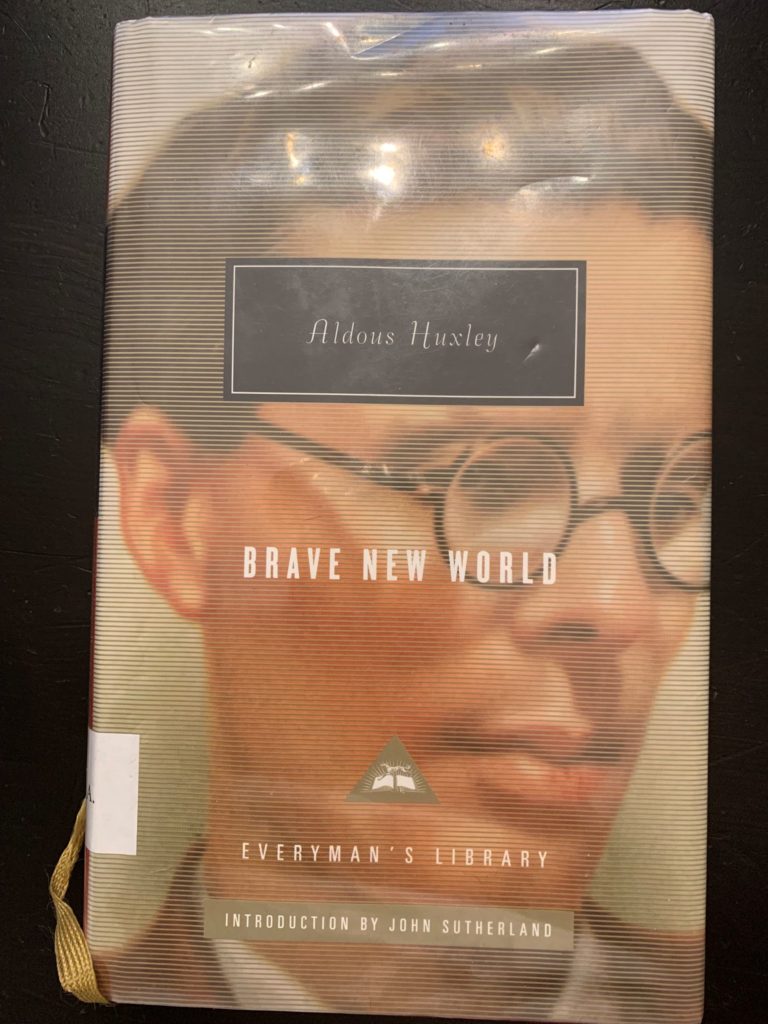This is one of those books that often is paired with “1984” or “Atlas Shrugged”. I was toying around with doing “Fahrenheit 451” after Christmas but then I heard some information on “The Dangerous History podcast” the other day that brought this one up again. I highly recommend the whole thing, but in case you just want to listen to some Orwell interpretation, I clipped the relevant part here.
A Brave New World was published in 1932. From the brief research that I have done, this work was an influence to both Orwell and Bradbury. As it turns out, Orwell was actually a student of Huxley’s when he was a French teacher and it appears that they had a professional relationship.
“Within the next generation I believe that the world’s leaders will discover that infant conditioning and narcohypnosis are more efficient, as instruments of government, than clubs and prisons, and that the lust for power can be just as completely satisfied by suggesting people into loving their servitude as by flogging them and kicking them into obedience.”
Aldous Huxley to George Orwell on publishing 1984.

What is going to make this review different than “1984” is that I plan to go through it quicker. I technically have as much time as I need from the library but I am going to try and not take eight months to get through it.
The plan is to review this book in five segments, this being one of them. There are fifteen chapters, so five chapters at a time and then a summary. This is also the first time I have read this, so my eye is not as tuned to the subplots and I am trying to follow the story line first. That being said, I have already seen a bunch of good stuff in the first two chapters. Of course with the holidays here, I don’t know if I will be able to keep this schedule, but let’s say that this will be compressed as compared to my previous review.
With the wide and quick swath through the book, I am going to again hit concepts. This time, I am not going to spend a bunch of time supporting the ideas to go along with them. I will save that for the final wrap-up. My ultimate idea is to build an AltF4 reading list for you to support the end your programming journey.
I may have tainted my opinion a little, I read the introduction before actually reading the book. So, I am not going in completely blind, I have some ideas about Huxley as an author, his influences and motivations when writing. One interesting thing that this particular edition has is a timeline of Huxley’s life compared to world events. Since I read it, I will introduce it here. The three central influences are
- Henry Ford
- Sigmund Freud
- Jazz music
While I haven’t seen any biographical links to justify Huxley’s fixation on those particular topics, I will be keeping an eye out for them in the book. I do have some working theories at the moment, but I will reserve those for the after I read the book. One fact to keep in mind if you are reading along, Henry Ford was born in 1863 so the years referred to in the book AF630 would be 630 years after Henry Ford was born or the year 2493 AD to us.
As I develop this concept a little more, I will likely include more than just dystopian fiction although that is where we will start.. I am interested again taking another look at other titles like “Catcher in the Rye” and “Crime and Punishment” as well as non-fiction such as “Seven Habits of Highly effective People”. Don’t fear, this isn’t going to be a book report blog, this is about developing a library of work and knowledge that supports the efforts of ending your programming.
End Your Programming Routine: As you might remember from “1984”, my final analysis didn’t line up with the ‘tin-foil-hatters’. On the surface, I see it. But look deeper into the story and then try to put it together, I couldn’t get there. Is it great fiction – yes. Is our course eerily charting the same direction – yes. Is it clairvoyant or a roadmap – No. In fact, I think “Animal Farm” is probably closer to a roadmap. That is on the list too.

Recent Comments